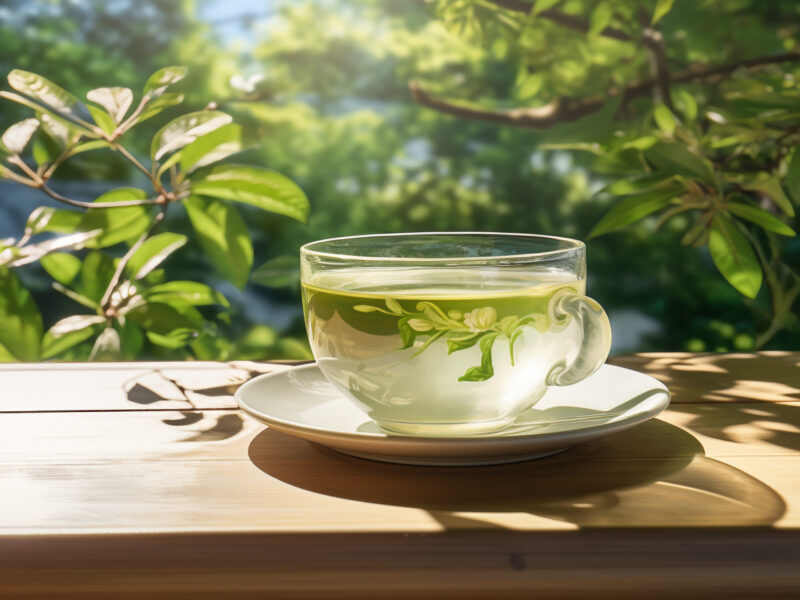Introduction to Green Tea Extract and Exercise Performance
Goodness, green tea extract isn’t just a cuppa your granny loves, it’s the secret weapon, the X factor many athletes and gym junkies swear by. Turns out, this unassuming tea beverage, that’s been charming the socks off folks from East to West, has a turbocharge button for your endurance.
Picture this – you’re all tuckered out from a gut-busting workout, you’re seeing stars and can’t fathom tying your shoelaces let alone trucking on! Well, with some help from the profound benefits of green tea extract, your endurance capacity and performance during both moderate-intensity exercise and intense exercise sessions may get a useful boost. Plus, it’s not just about endurance, regular consumption of this nature’s potion has been seen to improve performance too. The secret sauce of the green tea extract’s influence on exercise performance lies in the properties of chemical compounds known as catechins. Tea catechins, with mouths full of scientific names like “epigallocatechin gallate,” are a kind of polyphenol. These molecules react with your body on a cellular level to alter metabolism slightly. “Slow and steady wins the race,” they say, and the same works for fat oxidation. The tea catechins in green tea extract ramp up fat oxidation ever so slightly for a significant impact over time, meaning you could effectively burn fat while busting a gut – imagine that! Remember the skeleton in your high school science lab? Well, it turns out green tea catechins might even improve skeletal muscle function and endurance, not to mention the possible beneficial effects of green tea on antioxidant activity.
So, whether green tea is your cup of tea or not, there’s no denying that when it comes to the potential role of green tea in sports nutrition and sports psychology, it certainly brews a good game.
Green Tea Extract and Its Key Components: Catechins and Antioxidants
Endurance performance can be a real game of snakes and ladders, but researchers are now harping on about the effect of green tea extract on athletic prowess. It’s not just the green tea that’s tickling their fancy though, but also its key constituents: catechins and antioxidants. If you’re a stickler for details, you’d love to know that green tea is a rich source of a class of polyphenols called catechins which, combined with caffeine, seem to work wonders on endurance exercise. It’s like a dynamic duo in your favorite comic book, but in a cup of green tea instead! Not only do catechins and caffeine have a one-two punch effect, but their molecular makeup also fuels thermogenesis and fat oxidation. Now, ain’t that a kick in the tail feathers?

Studies have shown that green tea can increase fat oxidation at rest and during endurance training, which makes you think, huh? Green tea ingestion can also boost exercise endurance, and let me tell ya, it’s not hogwash. Regular intake of green tea catechin-enriched beverages, or popping a few green tea extract supplements, can do the trick. It’s no magic potion of course, but when paired with habitual exercise, the effects can be significant.
In fact, the American College of Sports Medicine has indicated that tea, particularly green and black, when paired with regular exercise, can enhance health and performance benefits. The antioxidant activity of green tea also factors in, acting like a little shield that wards off those nasty oxidative stresses that occur immediately after exercise. And as the cherry on the cake, tea could also contribute to a reduction in body weight – well there’s a happy side-effect!
So, if you’re taking green tea extract supplementation, not only are you warding off free radicals but also potentially capitalizing on a few additional health and exercise benefits.
Role of Green Tea Consumption in Enhancing Sport and Athletic Performance
Well! Hold onto your hats, folks, ’cause it seems green tea ain’t just a blessed little pick-me-up anymore. Science is abuzz with chatter about the impact that the humble cuppa green, packed to the brim with nifty compounds like green tea polyphenol and catechin, can have on athletic performance. Now, we’re not talking black tea here, but specifically its greener cousin, which, mind you, is positively chock-full of green tea catechins and caffeine. These power-packed properties of green tea get your motor running, so to speak, not just boosting your mood but having a pretty darn impressive effect on GTE, or the green tea extract thermogenesis-induced weight loss. Holy smokes, did you catch all that?
So, here’s the scoop. Consumption of green tea isn’t just about sipping a piping hot brew on a nippy Sunday morning anymore; it’s increasingly becoming some sportsperson’s secret weapon towards high performance. Whether you’re a finely tuned machine working out in the gym, or just someone out for a bout of cycling exercise at 60, it seems the effect of green tea catechins can substantially improve endurance. Researchers have also found that green tea supplementation increases the contribution of fat oxidation to total energy use during exercise. When combined with regular exercise alone, the impact of this magical brew can be even more significant. This extract’s activity seems to inhibit certain processes, resulting in a more efficient fat burn. By George, it almost sounds too good to be true!
So whether it’s in a classic brew, a catechin-enriched green tea beverage or even in the form of green tea supplements, there’s no denying that the effects of green tea can vary but the benefits? Dead set on skyrocketing your performance and health.
Drinking Green Tea vs Other Tea Beverages: Comparing Benefits
Well, well, well, if it isn’t a showdown between green tea and the myriad of other tea beverages. Whether it’s for sport performance or just kicking back, it seems like everyone’s got a cuppa tea they won’t stop going on about. So let’s jump into this, shall we? Green tea daily is a no-brainer for many – and for good reason. It’s packed with a winning combination of green tea catechins and polyphenols, the star components in green tea that have been shown to affect performance positively in various aspects of life. Heck, even extracts of green tea are being celebrated for their potential health benefits, with everyone and their grandma touting the effect of GTE (green tea extract).
But hold your horses, we’re not just talking about any old tea here. While you might reckon all types of tea are equal, the truth couldn’t be further. Let’s take black and green tea, for instance; both derived from the same plant but processed differently, and the difference is more than just the color. The activity of green tea extract packs quite the punch. It’s been linked to thermogenesis-induced weight loss by epigallocatechin gallate. This mouthful of a term basically means that green tea helps the body burn calories even when you’re laying low. And if you’re upping your intensity of exercise or engaging in exercise training, a daily dose of catechins used in green tea can help boost that sport performance. Even anecdotal evidence has suggested potential performance in male athletes with regular green tea catechin consumption. With all these reasons to bring out the kettle, it’s no wonder that green tea is taking the lead in the world of brews.
Fat Loss and Fat Oxidation During Exercise: The Green Tea Connection
Well, here’s the scoop on fat loss and fat oxidation during exercise with a surprising twist: Green Tea.

Wait, what? You’re pulling my leg, right? Not at all, mate.
The little leaf that could, Green Tea, has been packing a punch for fitness enthusiasts for some time now, and for good reason.
Hold onto your hats, folks! This ain’t your grandma’s cup of tea. The secret ingredient?
It’s called epigallocatechin gallate, but you can call it EGCG for short.
This superhero substance found in the tea made from Camellia sinensis leaves plays an outstanding role in speeding up fat loss, specifically by inhibition of a certain enzyme that breaks down our body’s norepinephrine or noradrenaline hormone, which prompts our bodies to break down fat.
Consequently, EGCG increases fat oxidation – that’s science speak for burning fat.- during exercise. So, essentially you’re getting more bang for your buck when you hit the gym. So, next time you’re thinking of staying hydrated for your workout, give the sports drinks a miss and reach out for some Green Tea instead!
Are There Health Benefits Of Green Tea Beyond Exercise Performance?
Well, bless my stars, you’ve hit the nail on the head! Green tea isn’t just a boost for your exercise routine; it’s a health dynamo through and through! I mean, beyond giving your workout an extra kick in the pants, this humble brew – depending on how the tea is made – can leave you skipping on cloud nine with a bevy of health benefits. We’re talking about a major player in the game of overall well being here, folks.
However, don’t just take it from me, science has its eyes wide open on this one. You’d be gobsmacked to uncover the wonders of green tea — as much as it boosts your exercise mojo, it might also have your back in the fight against unwanted weight, thanks to a mysterious hero known as ‘epigallocatechin gallate.’ Sounds like quite a mouthful, doesn’t it? Well, this little chap is a potent compound found in green tea that might just enhance loss by epigallocatechin gallate inhibition. The scoop is, it aids weight loss by inhibiting the enzymes in your body that digest fat. It’s like having your cake and eating it too, without needing to worry about piling on the pounds. Can you believe that? So, next time you pass by that box of green tea on the supermarket shelf, try and think beyond the gym. Phew, what a mouthful! But truly, what a marvel, this green tea!
Conclusion
The study carefully examined the health benefits of tea, specifically highlighting how tea is made and its composition, including the significant element: Epigallocatechin gallate (EGCG). Research showed a direct correlation between the loss by EGCG inhibition and health improvement, notably in weight loss and cancer prevention.
The EGCG in tea, particularly green tea, serves as a potent antioxidant inhibiting disease development. It works by blocking the enzymes that can degrade cancer inhibitors in the body, thus contributing to cancer prevention. Furthermore, EGCG aids in weight loss by inhibiting the process of fat absorption and enhancing fat metabolism, factors that contribute to obesity inhibition.
To fully benefit from EGCG, it is essential to understand how tea is made. Traditionally, the tea leaves are brewed in hot water to extract the EGCG effectively. The brewing temperature, duration, and the quality of tea leaves significantly influence the amount of EGCG extracted.
In conclusion, Epigallocatechin gallate in tea plays a crucial role in blocking disease onset, aiding in cancer prevention, and facilitating weight loss. Understanding how tea is made can help maximize these benefits from EGCG, providing a natural and accessible solution to major health issues in today’s society.

FAQ’s:
Q1. What is the effect of green tea extract on exercise performance?
A1. Green tea extract has been shown to improve exercise performance by increasing fat loss and improving endurance.
Q2. How does green tea extract enhance exercise performance?
A2. Green tea extract enhances exercise performance by increasing fat loss through the inhibition of epigallocatechin gallate and improving endurance.
Q3. What is epigallocatechin gallate?
A3. Epigallocatechin gallate (EGCG) is a polyphenol found in green tea that has been shown to have antioxidant and anti-inflammatory properties.
Q4. How is green tea made?
A4. Green tea is made by steaming and drying the leaves of the Camellia sinensis plant.
Q5. What are the benefits of green tea extract?
A5. Green tea extract has been shown to have numerous health benefits, including improved exercise performance, increased fat loss, and improved endurance.
Q6. Does green tea extract have any side effects?
A6. Green tea extract is generally considered safe, but it can cause side effects such as nausea, vomiting, and headaches in some people.
Q7. Is green tea extract effective for weight loss?
A7. Green tea extract has been shown to be effective for weight loss by increasing fat loss through the inhibition of epigallocatechin gallate.



 Melatonin And Jet Lag Management
Melatonin And Jet Lag Management
